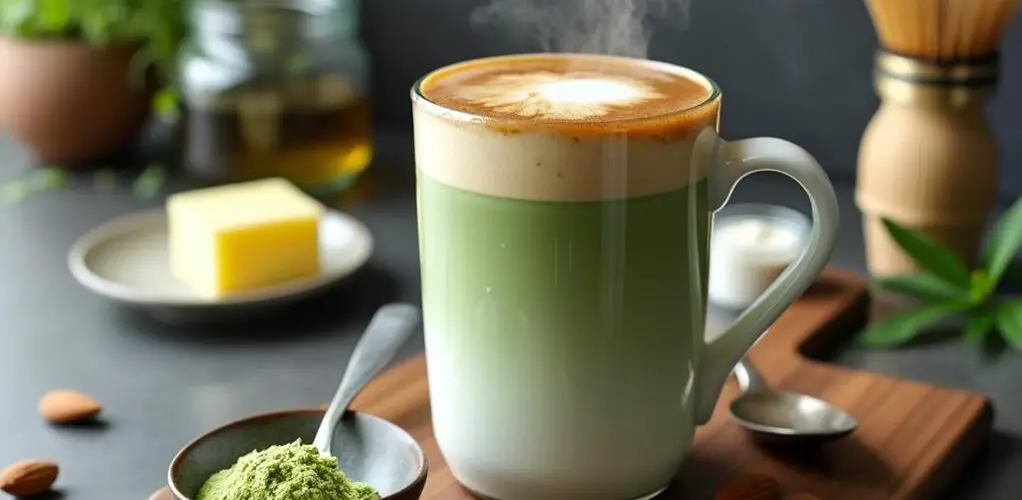
Maintaining ketosis on a low-carb diet requires mindful beverage choices. Opt for coffee or tea with unsweetened creamers, avoiding sugar to keep net carbs minimal. Bulletproof coffee, combining coffee with MCT oil or grass-fed butter, offers sustained energy. Keto-friendly sweeteners like stevia enhance taste without spiking blood sugar. Sparkling water and diet soft drinks provide zero-calorie hydration, while unsweetened almond milk is a suitable milk alternative with only 1-2 grams of net carbs per cup. Herbal teas, like chamomile and peppermint, deliver flavorful, carb-free options. These diverse beverages aid in adherence to keto guidelines, ensuring metabolic benefits and dietary satisfaction. More expansive details await those who wish to enhance their beverage selections.
Key Takeaways
- Bulletproof coffee combines brewed coffee with healthy fats, ideal for keto energy.
- Unsweetened almond milk and coconut milk provide low-carb, nut-based beverage options.
- Herbal teas like chamomile and peppermint offer flavorful, low-carb hydration.
- Sparkling water brands like Perrier and LaCroix provide zero-carb refreshment.
- Pure spirits like vodka and gin contain zero carbs, suitable for keto cocktails.
Overview of Keto-Friendly Drinks
An array of keto-friendly drinks can greatly enhance the dietary experience for individuals following a ketogenic lifestyle. Current keto beverage trends highlight the importance of low-carb options such as hot beverages, soft drinks, and flavored waters.
Coffee and tea, when consumed with unsweetened creamers and zero-calorie sweeteners, serve as popular choices that align with ketogenic principles. The use of these additives guarantees that net carb counts remain minimal, which is vital for maintaining ketosis. Additionally, Bulletproof coffee combines coffee with healthy fats, supporting energy and satiety.
Soft drinks sweetened with zero-calorie alternatives and sparkling water infused with natural flavors present viable hydration strategies for those on a ketogenic diet. These options provide a revitalizing break from traditional sugary beverages, aiding in the adherence to low-carb requirements.
Additionally, the inclusion of herbal teas and specifically chosen flavored waters offers both variety and nutritional benefits without compromising the diet's constraints.
Moreover, alcoholic beverages such as dry wines and spirits can be consumed in moderation, as they typically contain low carbohydrate content. This consideration allows for social enjoyment without jeopardizing the ketogenic state.
To summarize, a diverse selection of keto-friendly drinks not only supports hydration and enjoyment but also guarantees adherence to the stringent carbohydrate restrictions of the ketogenic diet.
Importance of Low-Carb Beverages
Low-carb beverages play a pivotal role in sustaining ketosis by preventing the intake of sugars that can disrupt the metabolic state essential for fat oxidation and weight loss.
Incorporating beverages sweetened with keto-friendly sweeteners like stevia, erythritol, and monk fruit can help maintain low carbohydrate intake.
Accurate calculation of net carbohydrates in drinks is critical for dietary management, ensuring individuals can diversify their beverage choices while adhering to ketogenic principles.
Replacing Sugary Drinks
For individuals adhering to a ketogenic diet, the importance of replacing sugary drinks with low-carb beverages cannot be overstated. Sugary drink alternatives are vital for maintaining ketosis, as the high carbohydrate content in traditional soft drinks, often exceeding 10 grams per serving, can considerably disrupt the fat-burning process.
Keto-friendly options, on the other hand, typically contain zero or very low net carbs, making them suitable for a low-carb lifestyle.
One effective strategy involves choosing beverages such as unsweetened iced tea or flavored sparkling water. These options not only offer invigorating hydration but also enhance beverage flavoring without contributing to carbohydrate intake.
Brands like Perrier and Aura Bora provide particularly low-carb choices, allowing individuals to enjoy a variety of flavors while strictly adhering to their dietary restrictions.
Additionally, vigilance in monitoring net carb content in beverages is essential. Even small amounts of hidden sugars can accumulate and impede ketosis.
By substituting high-carb drinks with low-carb alternatives, individuals can manage their carbohydrate intake more effectively, ensuring sustained adherence to the ketogenic diet.
This not only supports metabolic health but also enhances dietary satisfaction by providing flavorful, compliant beverage options.
Calculating Net Carbs
Understanding the importance of replacing sugary drinks with low-carb alternatives brings us to the essential process of calculating net carbs. Net carb calculations are vital for keto dieters, as they help determine the impact on ketosis. This calculation involves subtracting fiber and certain sugar alcohols from the total carbohydrate count.
For instance, beverages containing 1-5 grams of net carbs per serving, such as flavored sparkling waters or lemon juice, can fit seamlessly into a low-carb diet without disrupting ketosis. It is important to check labels meticulously for hidden sugars, as even negligible amounts can accumulate, considerably affecting overall carb intake.
To illustrate typical net carb content in beverages:
| Beverage Type | Total Carbs (g) | Net Carbs (g) |
|---|---|---|
| Flavored Sparkling Water | 2 | 1 |
| Lemon Juice | 4 | 3 |
| Diet Soda | 1 | 0 |
| Unsweetened Tea | 0 | 0 |
Monitoring net carbs in drinks promotes variety and enjoyment while adhering to the ketogenic diet. Consistently tracking net carb intake from beverages guarantees that your total daily carbs remain within the recommended limits for maintaining ketosis. This strategic approach aids in replacing sugary beverages with keto-friendly options, supporting long-term dietary goals.
Hot Drinks
When considering hot drinks on a ketogenic diet, options such as keto coffee made with unsweetened creamers and zero-calorie sweeteners are ideal, providing metabolic benefits from caffeine and chlorogenic acid.
Incorporating high-fat alternatives like MCT oil or heavy whipping cream can further enhance the ketosis process.
Additionally, low-carb tea varieties, including black and green tea, offer powerful antioxidants like EGCG with minimal carbohydrate content.
Herbal infusions, including chamomile and peppermint, further expand the repertoire of keto-friendly beverages, offering flavorful and low-carb alternatives.
Keto Coffee Varieties
Exploring the domain of keto coffee varieties offers a myriad of delicious options catering to low-carb dietary needs while providing essential energy and mental clarity. One prominent choice is Butter Bulletproof Coffee, which combines brewed coffee, unsalted butter, and MCT oil. This blend of healthy fats greatly contributes to sustained energy and enhanced cognitive function, underscoring the keto coffee benefits.
For those seeking versatility, keto coffee flavor pairings can enhance the experience. Keto Iced Coffee, made with brewed coffee and unsweetened almond milk, provides a revitalizing low-carb option, especially when paired with zero-calorie sweeteners.
Alternatively, Coffee with Whipped Cream offers a decadent touch by incorporating unsweetened whipped cream, delivering rich flavor without the carbohydrate load.
Dalgona Coffee, an increasingly popular option, involves whipping instant coffee with hot water and a keto-friendly sweetener to create a frothy, creamy texture. This beverage not only fits within low-carb guidelines but also adds an element of indulgence.
Finally, a variation such as Keto Hot Chocolate merges unsweetened cocoa powder, heavy cream, and a low-carb sweetener, satisfying chocolate cravings while maintaining minimal carbohydrate content.
These keto coffee varieties guarantee that adherents to a low-carb lifestyle can still enjoy their coffee rituals.
Low-Carb Tea Options
After investigating the rich world of keto coffee varieties, it is equally important to contemplate the spectrum of low-carb tea options that can complement a ketogenic lifestyle. Black and green tea are excellent choices, as they contain less than 1 gram of carbohydrates per cup. The antioxidants in green tea, particularly epigallocatechin gallate (EGCG), are known to support weight loss and overall health, aligning well with ketogenic goals.
Herbal varieties, such as chamomile, hibiscus, and peppermint, offer diverse flavors while maintaining a low-carb profile. These teas can be enjoyed without added sugars, fitting seamlessly into a keto regimen.
White tea, another low-carb option, provides a mild taste and a gentle caffeine boost, making it suitable for those who prefer a subtler flavor profile.
To enhance the flavor of these teas without compromising ketosis, unsweetened creamers or zero-calorie sweeteners can be added. This approach guarantees that the drink remains keto-friendly while offering a satisfying taste experience.
Understanding the tea benefits and selecting appropriate varieties can greatly enrich the dietary repertoire of anyone following a low-carb, ketogenic lifestyle.
Herbal Infusion Benefits**
Herbal infusions offer a plethora of benefits that make them an excellent choice for individuals adhering to a ketogenic diet. These beverages, including chamomile, hibiscus, and peppermint, are inherently low in carbohydrates, typically containing less than 1 gram per cup. This minimal carbohydrate content guarantees they can be enjoyed without disrupting ketosis, rendering them ideal for keto dieters.
The advantages of herbal infusions extend beyond their low-carb nature. These infusions often possess calming properties, particularly when caffeine-free, such as chamomile or peppermint, making them perfect for evening consumption. This can promote relaxation and improve sleep quality, a vital factor for maintaining overall health on a keto diet.
Additionally, the anti-inflammatory and digestive benefits associated with certain herbal infusions, like peppermint and hibiscus, can support digestive health and reduce inflammation, which is particularly beneficial for those aiming to optimize their ketogenic experience.
Experimenting with various herbal blends allows keto dieters to diversify their beverage options while adhering to low-carb guidelines. This not only enhances the sensory experience but also guarantees a wide array of health benefits, making herbal infusions a versatile and valuable component of a ketogenic lifestyle.
Coffee and Tea
When it comes to keto-friendly beverages, coffee and tea stand out as exceptional choices due to their minimal impact on carbohydrate intake. Coffee, nearly calorie-free and carb-free, is particularly beneficial for those on a ketogenic diet. One of the coffee benefits includes its caffeine content, which may aid in boosting metabolism and enhancing alertness.
Tea varieties, such as black and green tea, also offer significant low-carb options. Black tea, with its robust flavor, contains less than 1 gram of carbohydrates per cup, making it ideal for keto followers. Green tea, known for its high content of EGCG antioxidants, supports overall health while maintaining low carbohydrate levels.
| Drink | Carbs per Cup | Key Benefits | Suitable Additives |
|---|---|---|---|
| Black Coffee | 0 g | Boosts metabolism, alertness | Unsweetened creamers, zero-cal |
| Black Tea | <1 g | Robust flavor, low-carb | Unsweetened creamers, zero-cal |
| Green Tea | <1 g | High in antioxidants (EGCG) | Unsweetened creamers, zero-cal |
| Iced Tea | <1 g | Invigorating, low-carb | Unsweetened creamers, zero-cal |
To maximize the benefits of these drinks, avoid high-carb ingredients such as regular milk and sugar. Instead, opt for unsweetened creamers or zero-calorie sweeteners to enhance the flavor without compromising ketosis. This careful selection guarantees that coffee and tea remain excellent choices for a low-carb, keto-friendly diet.
Herbal Teas

Herbal teas, characterized by their low carbohydrate content, present a viable option for those adhering to a ketogenic diet, with most variants containing less than 1 gram of carbs per cup.
Varieties such as chamomile, hibiscus, and peppermint not only offer diverse and natural flavor profiles but also potential health benefits.
These teas can be consumed unsweetened or enhanced with keto-approved sweeteners, making them adaptable to personal taste preferences while maintaining minimal carbohydrate impact.
Low-Carb Herbal Benefits
Among the numerous beverage options for individuals adhering to a ketogenic diet, herbal teas stand out as a particularly beneficial choice due to their minimal carbohydrate content.
Herbal tea varieties such as chamomile and peppermint are not only low in carbs—often containing less than 1 gram per cup—but also offer substantial health benefits. Chamomile tea, for instance, is known to promote relaxation and improve sleep quality, factors that are essential for overall health and effective weight management on a keto diet.
Peppermint tea serves as a potent digestive aid, providing digestion support and potentially reducing feelings of hunger, which is advantageous for appetite control in ketogenic eating.
Additionally, hibiscus tea, rich in antioxidants, supports cardiovascular health by potentially lowering blood pressure while remaining keto-friendly.
The versatility of herbal teas, whether enjoyed hot or cold, offers invigorating flavor without added sugars, perfectly aligning with keto dietary restrictions.
- Chamomile tea: Promotes relaxation and better sleep quality.
- Peppermint tea: Aids digestion and helps control appetite.
- Hibiscus tea: Rich in antioxidants, supports heart health.
- Versatility: Enjoy hot or cold, no added sugars.
Incorporating these herbal teas into a ketogenic regimen can consequently contribute to both dietary compliance and enhanced well-being.
Popular Keto-Friendly Varieties
In exploring popular keto-friendly varieties, certain herbal teas consistently emerge as top choices due to their minimal carbohydrate content and health-promoting properties. Herbal tea varieties such as chamomile, hibiscus, and peppermint are particularly significant for their suitability within a ketogenic dietary framework. Given that most herbal teas contain less than 1 gram of carbohydrates per cup, they offer a flavorful hydration solution that does not disrupt ketosis.
The herbal tea benefits extend beyond their low-carb nature. Chamomile is renowned for its relaxation-inducing qualities, making it a preferred choice for evening consumption. Hibiscus tea, rich in antioxidants, supports cardiovascular health while providing a tangy flavor profile. Peppermint tea, known for its digestive benefits, can alleviate symptoms of gastrointestinal discomfort.
| Herbal Tea | Carbohydrates per Cup | Key Benefits |
|---|---|---|
| Chamomile | < 1 gram | Promotes relaxation |
| Hibiscus | < 1 gram | Rich in antioxidants |
| Peppermint | < 1 gram | Aids digestion |
Unlike traditional sweetened beverages, these herbal tea varieties can be enjoyed without added sugars, preserving their keto-friendly status. In addition, their versatility, whether consumed hot or iced, guarantees that they can accommodate a variety of flavor and temperature preferences while adhering to low-carb guidelines.
Enhancing Flavor Naturally
To enhance the experience of consuming herbal teas while adhering to a ketogenic diet, one can naturally enrich their flavors using keto-friendly additions. Herbal tea blends such as chamomile, hibiscus, and peppermint are inherently low in carbohydrates, making them a suitable choice for maintaining ketosis.
These teas not only provide a flavorful, caffeine-free beverage option but also offer beneficial antioxidants and anti-inflammatory properties that support overall health.
By incorporating natural sweeteners and other keto-friendly enhancers, one can boost the taste profile of herbal teas without compromising their low-carb regimen. For example, a squeeze of fresh lemon can introduce a zesty note, while a dash of unsweetened almond milk adds a creamy texture without adding unnecessary carbohydrates.
Additionally, experimenting with various herbal tea blends can create a diverse array of flavors and aromas, keeping the palate engaged and the body hydrated.
- Invigorating citrus burst with a squeeze of lemon
- Creamy richness with unsweetened almond milk
- Delightful sweetness using stevia
- Refreshing minty notes from fresh mint leaves
These enhancements guarantee that herbal tea remains a delightful and compliant option within the strict parameters of a ketogenic diet.
Diet Soft Drinks
Diet soft drinks present a viable low-carb option for individuals adhering to a ketogenic diet, primarily due to their zero-calorie and zero-carbohydrate content, which supports the maintenance of ketosis. Most diet sodas achieve this through the use of artificial sweeteners such as aspartame and saccharin.
While these sweeteners effectively provide a sweet taste without the carbohydrate load, some studies have suggested potential health risks associated with their long-term consumption. Consequently, selecting beverages that use naturally derived sweeteners like stevia can be a more prudent approach. Brands such as Zevia and Virgils Zero Sugar offer keto-friendly diet soft drinks that are free from artificial ingredients, presenting a safer alternative for those concerned about the implications of artificial sweeteners.
However, it is essential to scrutinize product labels meticulously, as some diet soft drinks might contain hidden sugars or additives that could inadvertently disrupt ketosis. For those looking for other keto-friendly options, products from Hu Chocolate Bars might be a delicious alternative to satisfy sweet cravings.
Incorporating these beverages into one's hydration strategies can be beneficial, but moderation remains essential. Excessive consumption of diet soft drinks may induce cravings for sweet foods, potentially jeopardizing the overall dietary goals of a ketogenic regimen.
Balancing intake and remaining vigilant about ingredient lists can optimize the benefits of these low-carb alternatives.
Sparkling Water Options
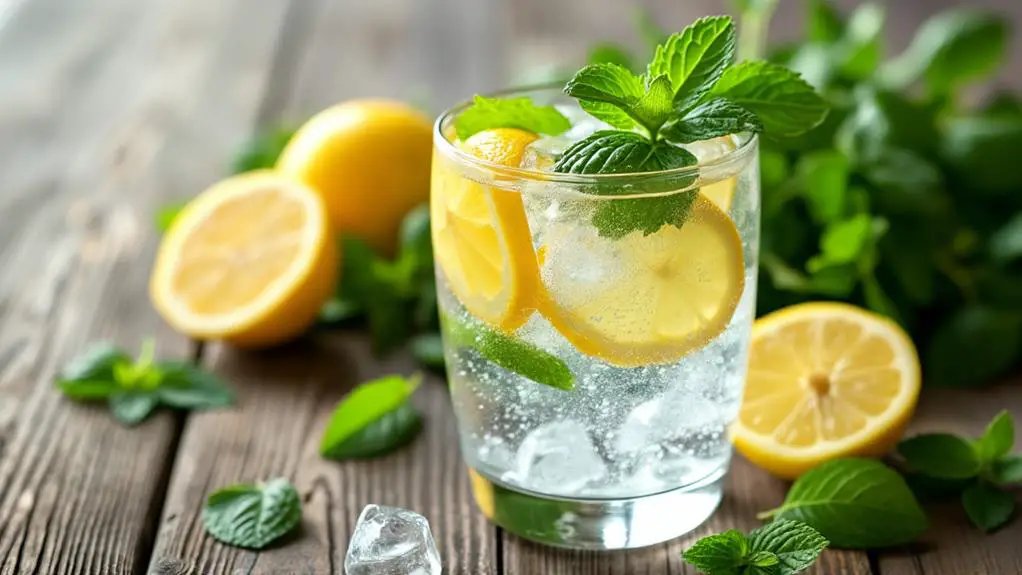
Sparkling water, a naturally calorie-free and carb-free beverage, stands out as an ideal choice for individuals adhering to a ketogenic diet.
Renowned brands such as Perrier and Aura Bora offer flavored options that align with keto guidelines due to their use of natural fruit essences and zero-carb enhancers.
It is imperative to examine product labels meticulously to avoid added sugars, ensuring the beverage remains within the acceptable carbohydrate limits.
Top Brands Available
When adhering to a ketogenic diet, selecting beverages that align with dietary restrictions while delivering satisfying flavors can be challenging. Within the spectrum of sparkling water options, certain brands stand out due to their adherence to low-carb principles and flavor variety.
Perrier and LaCroix are renowned for their wide range of flavors and zero-carb profiles, making them ideal choices for keto dieters. Aura Bora offers a unique twist with its herbal and fruit-infused sparkling waters, ensuring zero added sugars or carbs while providing a revitalizing alternative.
Spindrift, while slightly higher in carbs due to its real fruit juice content, offers a natural and flavorful option with 1-5 grams of net carbs per serving. Waterloo Sparkling Water impresses with its bold, sugar-free, and calorie-free flavors, fitting seamlessly into a keto regimen.
Finally, Bubly stands out for its diverse flavor selection, all of which contain no calories and no carbs, hence supporting ketosis maintenance.
- Perrier and LaCroix: Flavorful and carb-free
- Aura Bora: Unique herbal and fruit infusions
- Spindrift: Real fruit juice, minimal carbs
- Waterloo and Bubly: Bold, sugar-free options
These sparkling water brands successfully combine ketogenic compatibility with diverse and enjoyable taste experiences.
Flavor Enhancements Tips**
Enhancing the flavor of sparkling water can transform it from a simple beverage to a delightful and stimulating experience, especially for those adhering to a ketogenic diet. Sparkling water, inherently low in carbohydrates, serves as an excellent alternative to sugary soft drinks.
To improve its taste, consider incorporating slices of fresh lemon, lime, or cucumber. These additions contribute minimal net carbs while providing a revitalizing flavor profile.
For a nuanced taste, infuse sparkling water with herbs such as mint or basil. These herbs impart a rejuvenating twist without adding any carbohydrates, making them ideal for maintaining ketosis.
Another effective strategy is to use zero-carb flavored water enhancers from reputable brands like Mio or Stur. These enhancers add both sweetness and variety to your sparkling water, all while keeping the carb count at zero.
Additionally, explore unsweetened flavored sparkling waters from brands like LaCroix or Spindrift. These products offer a diverse array of flavor combinations, ensuring that your beverage remains both tasty and keto-friendly.
Keto-Friendly Juices
Although many fruit juices are laden with sugars and unsuitable for a ketogenic diet, select options like lemon and lime juices stand out as keto-friendly due to their low carbohydrate content.
Lemon juice contains approximately 1 gram of net carbs per tablespoon, while lime juice has around 0.5 grams. These juices can be excellent low carb mixers in keto juice recipes, providing a zesty flavor without compromising your carb limits.
Vegetable juices also present a viable option, but it is imperative to scrutinize labels for added sugars that could increase carbohydrate content. Freshly juiced vegetables retain beneficial fiber, making them suitable for moderate consumption to avoid excessive carb intake.
Opt for vegetables like celery, cucumber, and spinach, which are naturally low in carbs and can enhance the nutritional profile of your beverages. Additionally, high-fat dairy options like heavy whipping cream can be used to create creamy, low-carb smoothies.
To evoke the potential benefits and possibilities of keto-friendly juices, consider the following:
- Burst of Flavor: Enjoy a revitalizing twist in your drinks.
- Nutrient-Rich: Incorporate essential vitamins and minerals.
- Versatile Use: Suitable for a variety of keto juice recipes.
- Low-Carb Assurance: Stay within your daily carb limits.
Milk Alternatives
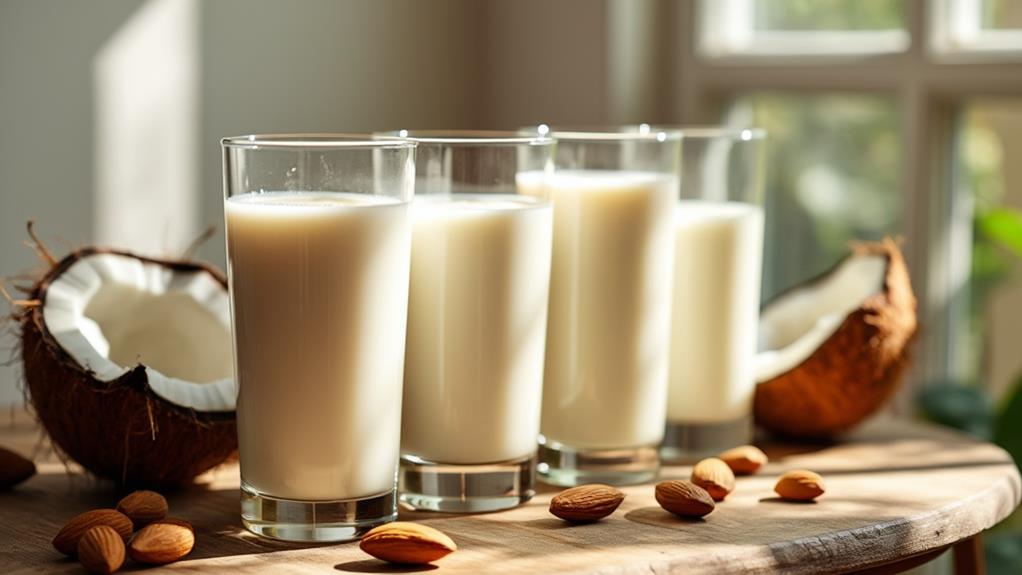
Given the natural sugars present in cow's milk, which render it unsuitable for a ketogenic diet due to its higher carbohydrate content, milk alternatives become vital for those adhering to this lifestyle.
Unsweetened plant-based milks, such as almond and coconut milk, are excellent keto-friendly options, typically containing only 1-2 grams of net carbs per cup. These nut milk benefits extend beyond their low carbohydrate content, offering essential nutrients such as vitamin E, calcium, and healthy fats without compromising ketosis.
Furthermore, unsweetened coconut milk shares similar properties with coconut oil, providing MCTs that support energy production and enhance ketone levels.
Other nut-based milks, including macadamia nut and flaxseed milk, also provide viable low-carb alternatives. These options often contain negligible amounts of added sugars, making them ideal for maintaining a state of ketosis.
When selecting milk alternatives, it is imperative to opt for unsweetened versions to avoid unnecessary carbohydrates. Checking product labels is significant to verify that there are no hidden sugars or additional carbs that could disrupt ketosis.
Incorporating these alternatives into your diet can be seamless. For instance, almond milk recipes can range from keto-friendly smoothies to low-carb desserts, providing versatility and nutritional benefits.
Consequently, choosing the right milk alternative is a strategic decision for those committed to a ketogenic lifestyle.
Alcoholic Beverages
Maneuvering the landscape of alcoholic beverages on a ketogenic diet requires careful consideration due to their potential impact on ketosis.
Pure spirits such as vodka, gin, tequila, rum, and whiskey are ideal choices, containing 0 grams of carbs and sugar per 44ml serving. For wine aficionados, dry wines like Sauvignon Blanc and Pinot Noir offer a keto-friendly option, each typically containing under 3 grams of carbs per 5 oz glass.
Consuming these in moderation can aid in maintaining steady blood sugar levels, which is essential for those managing diabetes with a keto diet. Beer enthusiasts need not despair; light beers such as Bud Light Next provide low-carb options, with around 0-3 grams of carbs per 12 oz serving.
When crafting cocktail recipes, selecting low carb mixers is imperative. Sugar-free choices, such as vodka with soda water or gin with slimline tonic, allow for enjoyable beverages without jeopardizing your carb count.
It is critical to emphasize moderation; excessive alcohol intake can disrupt ketosis and contribute to weight gain.
- Zero-Carb Spirits: Vodka, gin, tequila, rum, whiskey—ideal for keto.
- Dry Wines: Sauvignon Blanc, Pinot Noir—under 3 grams of carbs per glass.
- Light Beers: Bud Light Next—0-3 grams of carbs per can.
- Low Carb Mixers: Sugar-free soda water, slimline tonic—keep cocktails keto-friendly.
Maintaining a ketogenic lifestyle while enjoying alcoholic beverages is achievable with informed choices and mindful consumption.
Energy Drinks
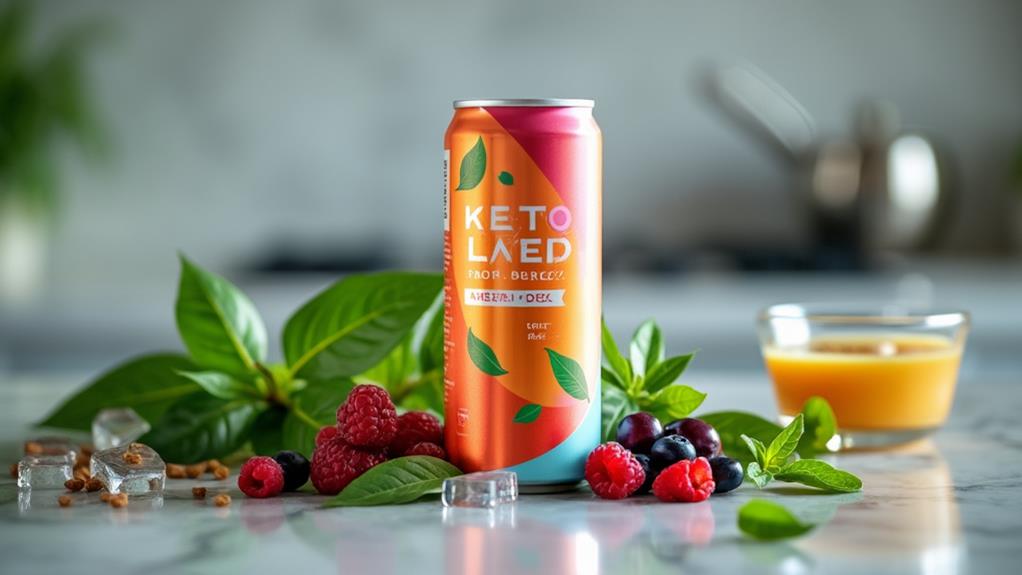
Steering through the domain of energy drinks on a ketogenic diet necessitates a discerning approach due to the potential impact of hidden sugars and carbs. Traditional energy drinks are often laden with sugar, which can disrupt ketosis and impede weight loss efforts.
However, certain brands provide keto-friendly alternatives by utilizing natural sweeteners like stevia, thereby maintaining a minimal carbohydrate profile. Understanding the balance of macronutrients is essential for keto success, as even small deviations can impact ketone levels.
Popular options such as Bang and C4 have garnered favorable energy drink reviews for their efficacy and alignment with keto dietary goals. These beverages contain zero sugar and minimal carbohydrates, making them suitable for maintaining ketosis while delivering the desired caffeine boost.
Despite these benefits, it remains important to monitor overall caffeine intake, as excessive consumption can lead to adverse effects, particularly in individuals adhering to a ketogenic diet.
When selecting energy drinks, always scrutinize ingredient labels to identify hidden sugars and carbohydrates that could inadvertently compromise your low-carb regimen. Incorporating these considerations into your keto drink recipes guarantees that your dietary objectives remain intact.
Sports Drinks
Sports Drinks
Traditional sports drinks are often laden with sugars, rendering them unsuitable for those adhering to a ketogenic diet. For keto sports enthusiasts, maintaining ideal hydration strategies is paramount, particularly given the carbohydrate restrictions inherent to this dietary approach.
It's also vital to monitor electrolyte intake to avoid symptoms such as muscle cramps and fatigue, which can be exacerbated by intense physical activity. Products like Gatorade Zero provide a viable alternative, offering zero sugar while still delivering essential hydration.
Additionally, electrolyte replenishment is significant in a keto diet, especially during physical exertion. Ultima Replenisher is an exemplary product in this regard, offering low-carb formulations rich in necessary electrolytes without the sugar spikes associated with traditional sports drinks.
- Zero sugar options: Choose products like Gatorade Zero to avoid sugar-induced ketosis disruptions.
- Electrolyte balance: Opt for electrolyte-rich solutions such as Ultima Replenisher to sustain energy levels.
- Natural sweeteners: Look for drinks sweetened with stevia to prevent hidden carb intake.
- Label vigilance: Always check for hidden sugars and carbs that could sabotage ketosis.
When selecting sports drinks tailored for keto sports, it is essential to scrutinize labels for hidden sugars and carbs, ensuring they align with ketogenic hydration strategies.
Health Risks
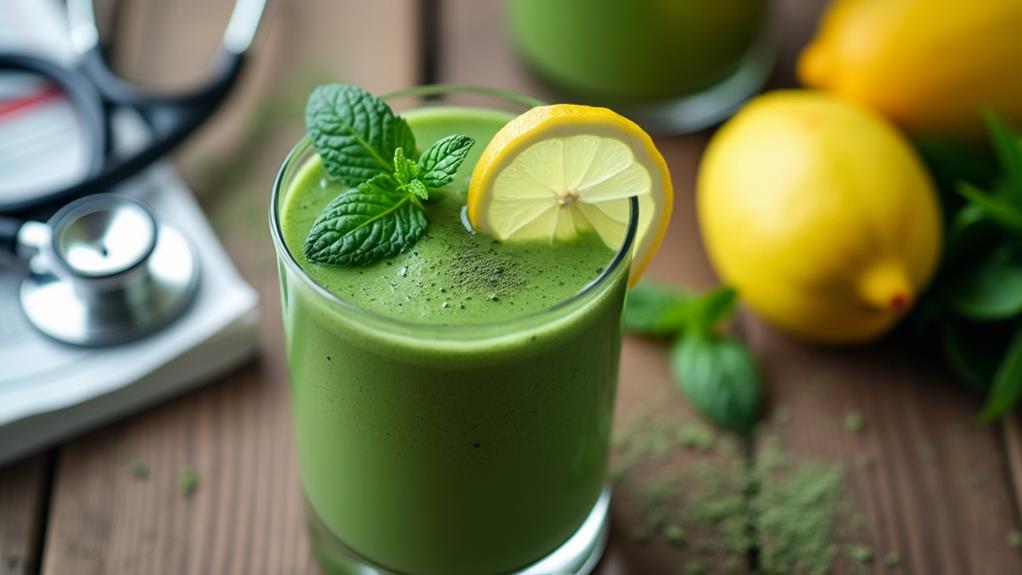
While keto-friendly sports drinks can offer benefits for hydration and electrolyte balance, it is important to recognize the potential health risks associated with certain beverages often marketed to those on a ketogenic diet.
For instance, drinking beverages with saturated fats can affect cholesterol levels, which is essential to monitor while on a keto diet. Many energy drinks and sports drinks contain high levels of added sugars, which can disrupt ketosis and contribute to weight gain. For instance, sugary cocktails such as margaritas can contain over 36 grams of carbs per serving, greatly hindering weight loss efforts on a keto regimen.
Moreover, excessive caffeine intake from energy drinks can exacerbate health risks, including increased anxiety, insomnia, and raised heart rate. These adverse effects can be particularly pronounced for individuals adhering to a low-carb diet, where metabolic adjustments are already underway.
Furthermore, the presence of hidden sugars and artificial sweeteners in various beverages necessitates diligent monitoring of ingredient labels. These additives can negatively impact health and ketosis maintenance, creating unforeseen obstacles in achieving dietary goals.
Thus, drink moderation and careful selection of beverages, such as opting for alternatives like Gatorade Zero, are vital. This approach guarantees the maintenance of ketosis while mitigating potential health risks associated with the consumption of inappropriate drinks.
Flavorful Beverage Alternatives
Finding flavorful beverage alternatives that align with a ketogenic diet can greatly enhance both adherence and enjoyment without compromising ketosis. One such option is unsweetened herbal teas, which are inherently low in carbohydrates. Herbal tea varieties like chamomile, hibiscus, and peppermint can be consumed either hot or iced, providing a diverse range of flavors and keto beverage benefits.
Another invigorating option is infusing water with slices of low-carb fruits such as lemon or lime. This simple addition results in a flavored water that contains only about 1-5 grams of net carbs per serving, making it an excellent choice for those watching their carbohydrate intake.
Keto-friendly smoothies present another versatile and nutritious option. Utilizing unsweetened almond or coconut milk as a base, these smoothies can be enhanced with low-carb ingredients like spinach, avocado, and protein powder, ensuring they remain within ketogenic guidelines while delivering essential nutrients.
Flavored sparkling waters offer a bubbly alternative to traditional sugary beverages. Brands like Perrier and Aura Bora provide zero net carbs and no added sugars, making them ideal for a ketogenic lifestyle.
- Unsweetened Herbal Teas: Chamomile, hibiscus, peppermint.
- Infused Water: Lemon, lime.
- Keto Smoothies: Almond milk, coconut milk, spinach, avocado.
- Flavored Sparkling Waters: Perrier, Aura Bora.
These alternatives provide flavorful, low-carb options that support a ketogenic diet.
Further Reading and Resources
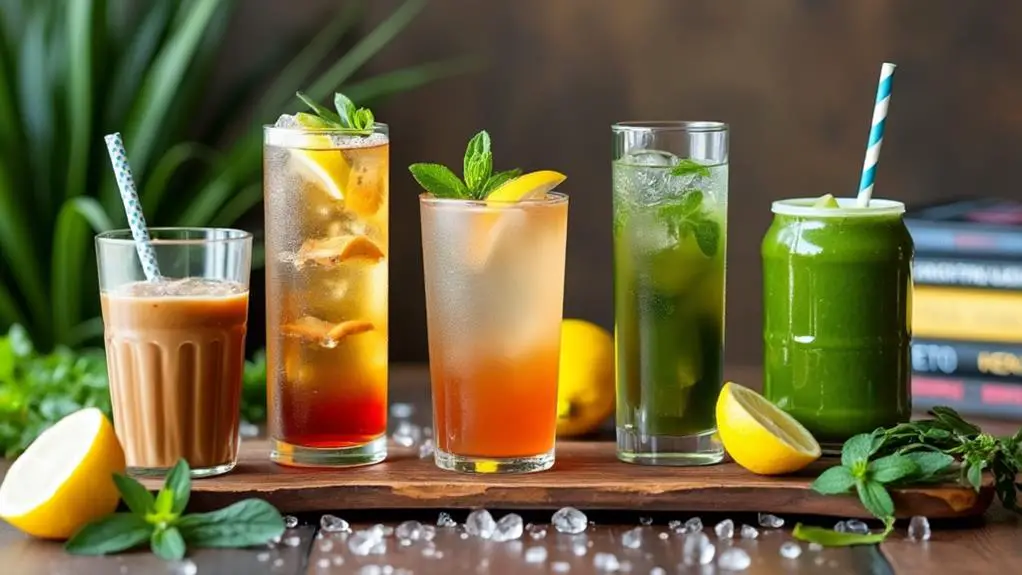
To investigate deeper into the realm of keto-friendly beverages, a wealth of resources and guides are available to enhance your dietary regimen. These materials are essential for understanding the nuances of keto beverage trends and identifying low-carb mixers that align with your health goals.
Guides on keto-friendly drinks offer detailed insights into low-carb options such as coffee, tea, and sparkling water. They also provide a thorough analysis of the best and worst alcoholic drinks for maintaining ketosis, complete with carb counts and practical recommendations. Additionally, these resources explore the nutritional benefits and potential drawbacks of popular beverages, elucidating their impact on overall health and weight loss objectives.
For those who enjoy variety, resources on keto coffee creamers and flavored drink recipes are invaluable. They guarantee that your beverage choices remain exciting without compromising on dietary restrictions. Staying abreast of the latest keto beverage trends and new product releases is vital for anyone committed to a low-carb lifestyle.
'''markdown
| Resource Type | Description |
|---|---|
| Keto Drink Guides | Detailed insights on low-carb beverages like coffee, tea, and sparkling water |
| Alcoholic Drink Analysis | Best and worst alcoholic drinks for ketosis with carb counts |
| Nutritional Information | Impact of popular beverages on health and weight loss |
| Keto Coffee Creamers | Options for maintaining flavor without sacrificing keto compliance |
| Trend Updates | Latest trends and new product releases in keto-friendly drinks |
'''
Utilize these resources to optimize your keto diet and enjoy a varied, satisfying beverage repertoire.
Frequently Asked Questions
What Drinks Can You Drink on a Keto Diet?
Keto beverages suitable for a low-carb diet include black coffee, unsweetened tea, sparkling water, and low-carb smoothies. Additionally, dry wines and light beers with minimal carbohydrate content can be consumed in moderation, adhering to keto guidelines.
What Drinks Are Good for Low Carb Diet?
For a low-carb diet, low-carb smoothies made with unsweetened almond milk and nutrient-dense greens are recommended. Additionally, herbal teas provide a carbohydrate-free option, supporting hydration and offering various health benefits without compromising dietary restrictions.
Can I Have Coke Zero While on Keto?
Yes, you can consume Coke Zero while on keto, as it contains zero carbohydrates. However, be mindful of keto myths regarding artificial sweeteners, as individual tolerance varies and excessive intake may impact health and weight loss.
What Mixed Drinks Have No Carbs?
Mixed drinks that have no carbs include low carb cocktails made with pure spirits such as vodka, gin, tequila, rum, and whiskey. Using keto mixers like soda water, flavored sparkling water, or sugar-free alternatives maintains their no-carb profile.
Conclusion
In conclusion, the consumption of keto-friendly drinks is essential for maintaining ketosis while adhering to a low-carb diet. Hot drinks such as coffee and tea, alongside herbal teas, offer diverse options for hydration and enjoyment. Sports drinks should be chosen carefully to avoid excess carbohydrates. Awareness of potential health risks and exploring flavorful alternatives can enhance dietary adherence and satisfaction. Further reading and resources provide additional guidance for those committed to a ketogenic lifestyle.

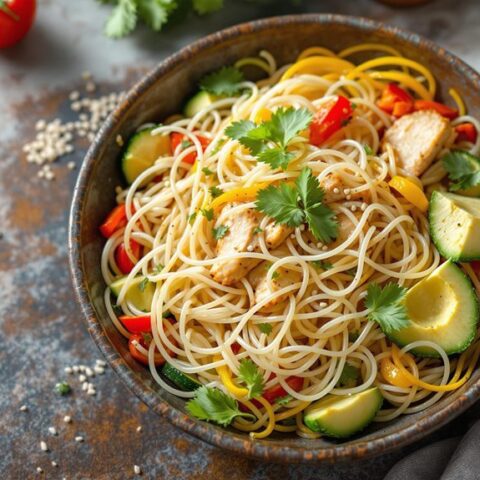

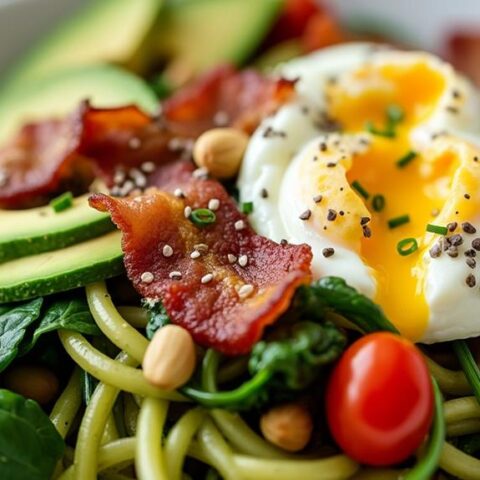
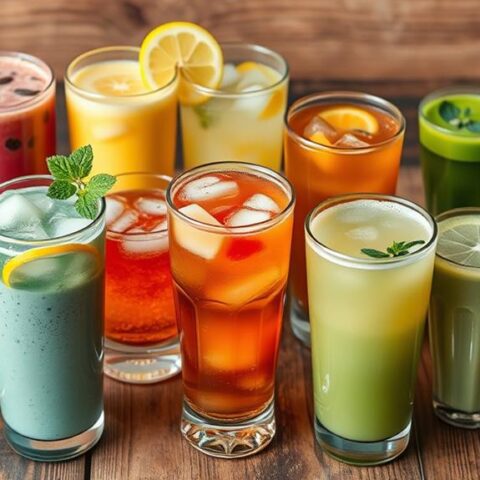
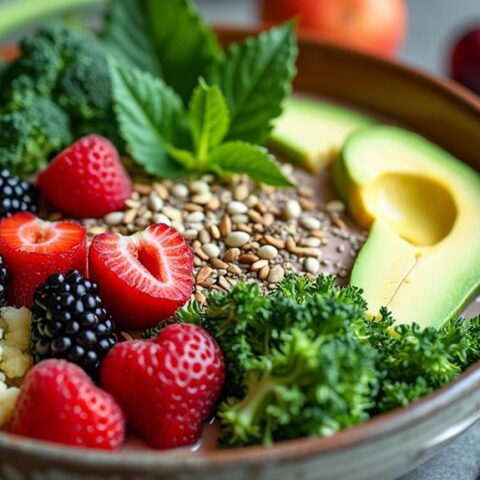




No Comments